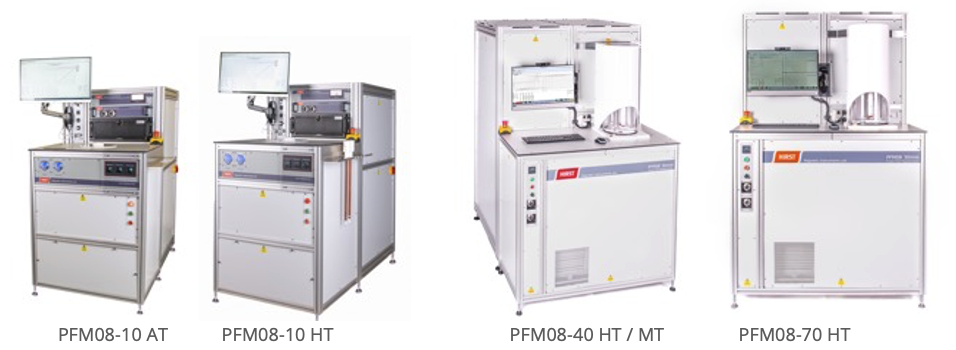The PFM-08 range of magnet characterisation magnetometer can accurately and quickly measure the magnetic hysteresis loop and extract key values for all magnetic materials (particularly suited for high performance magnetic materials such as NdFeB, SmCo, AlNiCo and coated magnets). With a maximum field of 10.5T (8356 kA/m / 105 kOe) even the most coercive materials and highest grades of NdFeB magnets can be measured, while traditional permeameters cannot measure these high coercivity materials due to pole piece saturation limitations. The 8th generation of PFMs have world leading sample temperature control accuracy and test to test repeatability. They also uniquely feature the eddy current correction (patented F-2F algorithm), Self-Demagnetisation Field (SDF) correction function (to allow accurate measurement of a wide range of samples from cylinders, cuboids and arbitrary sample shapes), and Hirst proprietary Self De-magnetisation Field Function SDFF™ (patented) which accurately generates an open to closed circuit mapping (O2C™). The first generation of Hirst industrial PFM was launched in 1998 and the company won an Institute of Physics business award for the SDFF™ technology in 2020. HirstLab v2 software and Hirst proprietary SDFF™ technology has been implemented in collaboration with the National Institute of Metrology (NIM), Beijing, as part of a contract for the first PFM08-30 MT placed by NIM. The generation 8 machines were launched in 2023.
For sales in China contact Jian He of NIM or for rest of the world contact [email protected]

Generation 8 PFMs delivering fast and repeatable measurements of key magnet parameters.
Key benefits
- All high grade permanent magnets can be fully characterised such as NdFeB (inc AH), SmCo and coated magnets
- Repeatability better than ±0.2% at ambient temperature for HcJ and Br on certain samples and models
- Range of sample sizes: 1x1x1mm to 70mm as standard and larger sample sizes on request
- Can test samples that are magnetised or unmagnetised
- The PFM contains an integral capacitive discharge magnetiser (and demagnetiser) producing a field of over 10T meaning the highest grades of permanent magnetic material can be tested (which is not possible on traditional permeameters)
- Full 4 quadrant measurement of magnetic hysteresis loop
- User friendly HirstLab v2 software for fast precise measurements
- HirstLab v2 software automatically extracts critical parameters: Remanence: Br, Coercivity: HcJ, HcB, Maximum energy product: BHMax, Saturation values: Hsat, Jsat, Squareness Coefficients: Hk, Hk/HcJ, Sa, and more are all automatically extracted from every measurement and displayed separately alongside JH and BH loops.
- Sample shapes: cylinder, cuboid, and arbitrary shapes with built in Self-Demagnetisation Field (SDF) shape correction function. Small samples and certain arbitrary or irregular shapes may require sample support shoes to achieve sufficient sample temperature control
- Precision sample temperature measurement with integral high precision temperature control: Temperature measurements from -5oC to +5oC of room ambient (23 oC) ±0.2°C and up to +230°C on some HT models and down to –40oC for the PFM08-40 MT
- Unique Self Demagnetisation Field Function SDFF™ in HirstLab v2 which accurately generates an open-to-closed circuit mapping (O2C™) for the magnet sample giving accurate closed loop magnet parameters. Thus, customers no longer need a permeameter and a PFM, Generation 8 PFMs give permeameter-like measurements for all grades of magnets
- Meets IEC (International Electrotechnical Commission) TR-62331 specifications for permanent magnets which is a non-destructive testing method.
Applications
- Designed for characterisation of hard magnetic materials in both production control and research applications for all high performance permanent magnet materials (NdFeB, SmCo, AlNiCo) including high grade NdFeB coated samples
- The ambient temperature (AT) versions of the PFM are ideal for production testing and quality control
- High temperature (HT) versions support measurement up to 230°C for development and quality control
- Low temperature versions support measurements down to -40°C for materials research
